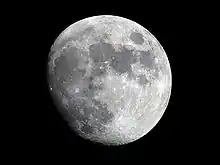Crozier (crater)
Crozier is a lunar impact crater that is located on the southwest edge of Mare Fecunditatis, a lunar mare in the eastern part of the Moon's near side. It lies to the east-northeast of the prominent crater Colombo, and southeast of the small crater Bellot.
.png.webp) LRO image | |
| Coordinates | 13.5°S 50.8°E |
|---|---|
| Diameter | 22 km |
| Depth | 1.3 km |
| Colongitude | 310° at sunrise |
| Eponym | Francis R. M. Crozier |


The narrow rim of this crater forms a distorted enclosure that has outward bulges along the northwest, southwest, and southeastern sides. The interior floor has been resurfaced and nearly filled by basaltic lava, producing a level surface with a low albedo that matches the dark hue of the nearby lunar mare. Nearly adjacent to the outer rim are the similar flooded craters Crozier D to the east and Crozier M to the southeast.
Satellite craters
By convention these features are identified on lunar maps by placing the letter on the side of the crater midpoint that is closest to Crozier.
| Crozier | Coordinates | Diameter, km |
|---|---|---|
| B | 12.55°S 52.39°E | 8.9 |
| D | 13.46°S 51.59°E | 19.4 |
| E | 12.67°S 51.95°E | 6.0 |
| F | 12.79°S 51.00°E | 4.6 |
| G | 12.02°S 49.99°E | 4.1 |
| H | 14.01°S 49.38°E | 10.5 |
| L | 10.00°S 51.50°E | 8.4 |
| M | 8.84°S 51.36°E | 5.9 |
.png.webp) The concentric crater Crozier H
The concentric crater Crozier H Crozier H, from Apollo 8
Crozier H, from Apollo 8
References
- Andersson, L. E.; Whitaker, E. A. (1982). NASA Catalogue of Lunar Nomenclature. NASA RP-1097.CS1 maint: ref=harv (link)
- Blue, Jennifer (July 25, 2007). "Crozier in Gazetteer of Planetary Nomenclature". USGS. Retrieved 2019-02-05.CS1 maint: ref=harv (link)
- Bussey, B.; Spudis, P. (2004). The Clementine Atlas of the Moon. New York: Cambridge University Press. ISBN 978-0-521-81528-4.CS1 maint: ref=harv (link)
- Cocks, Elijah E.; Cocks, Josiah C. (1995). Who's Who on the Moon: A Biographical Dictionary of Lunar Nomenclature. Tudor Publishers. ISBN 978-0-936389-27-1.CS1 maint: ref=harv (link)
- McDowell, Jonathan (July 15, 2007). "Lunar Nomenclature". Jonathan's Space Report. Retrieved 2007-10-24.CS1 maint: ref=harv (link)
- Menzel, D. H.; Minnaert, M.; Levin, B.; Dollfus, A.; Bell, B. (1971). "Report on Lunar Nomenclature by the Working Group of Commission 17 of the IAU". Space Science Reviews. 12 (2): 136–186. Bibcode:1971SSRv...12..136M. doi:10.1007/BF00171763.
- Moore, Patrick (2001). On the Moon. Sterling Publishing Co. ISBN 978-0-304-35469-6.CS1 maint: ref=harv (link)
- Price, Fred W. (1988). The Moon Observer's Handbook. Cambridge University Press. ISBN 978-0-521-33500-3.CS1 maint: ref=harv (link)
- Rükl, Antonín (1990). Atlas of the Moon. Kalmbach Books. ISBN 978-0-913135-17-4.CS1 maint: ref=harv (link)
- Webb, Rev. T. W. (1962). Celestial Objects for Common Telescopes (6th revised ed.). Dover. ISBN 978-0-486-20917-3.CS1 maint: ref=harv (link)
- Whitaker, Ewen A. (1999). Mapping and Naming the Moon. Cambridge University Press. ISBN 978-0-521-62248-6.CS1 maint: ref=harv (link)
- Wlasuk, Peter T. (2000). Observing the Moon. Springer. ISBN 978-1-85233-193-1.CS1 maint: ref=harv (link)
